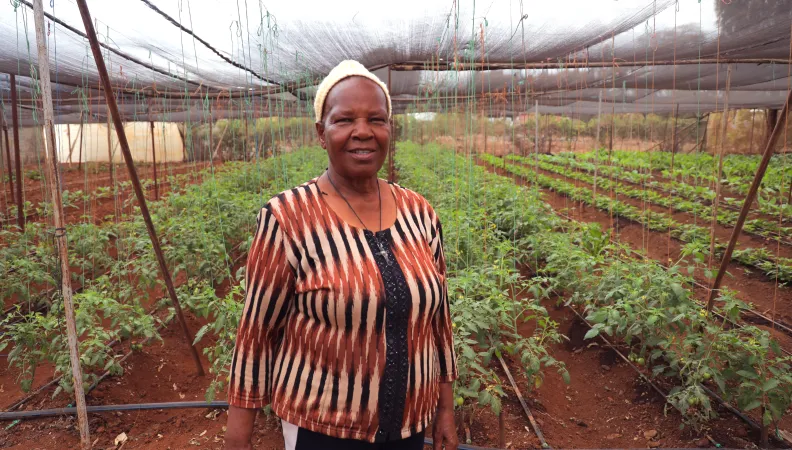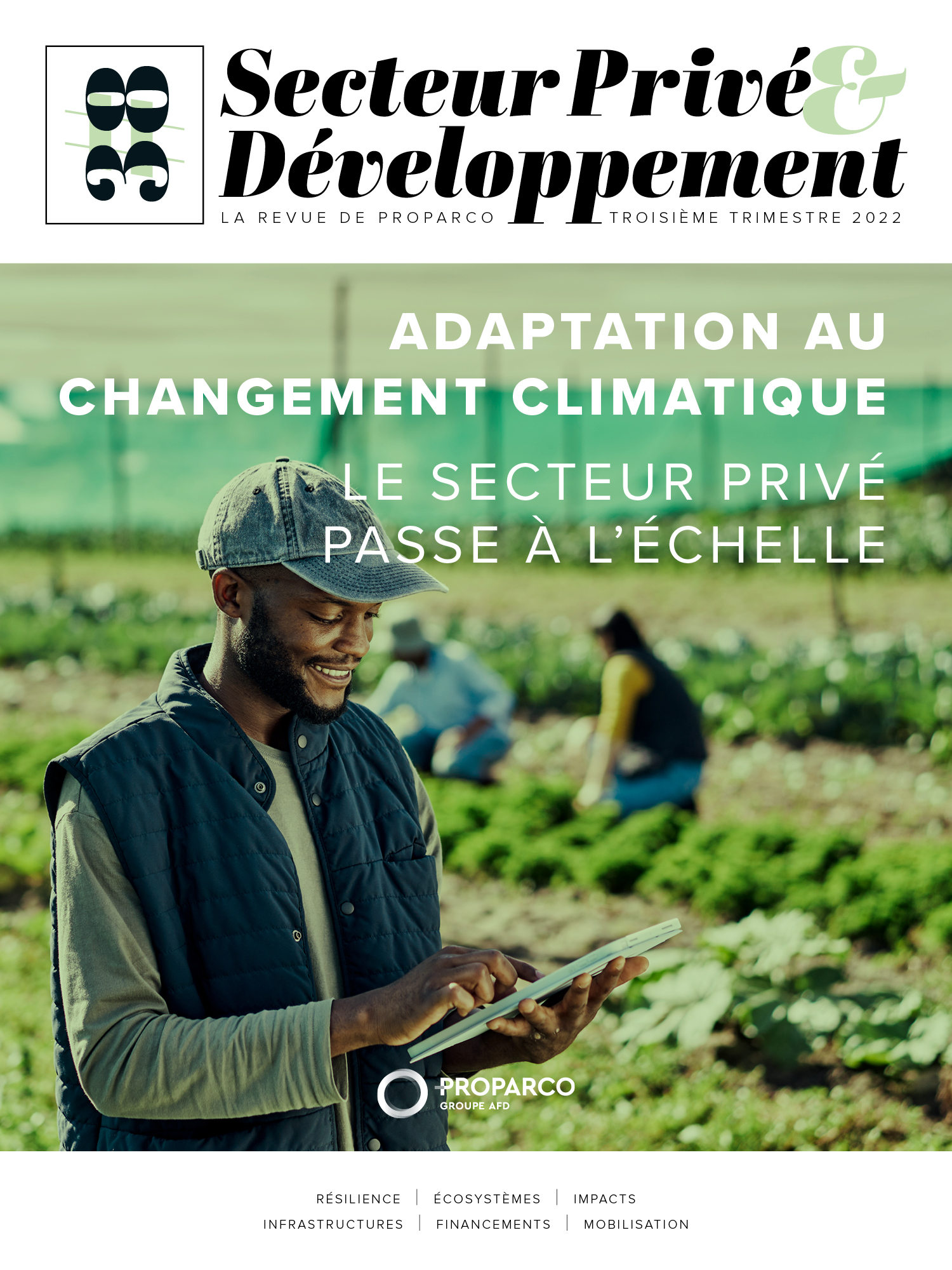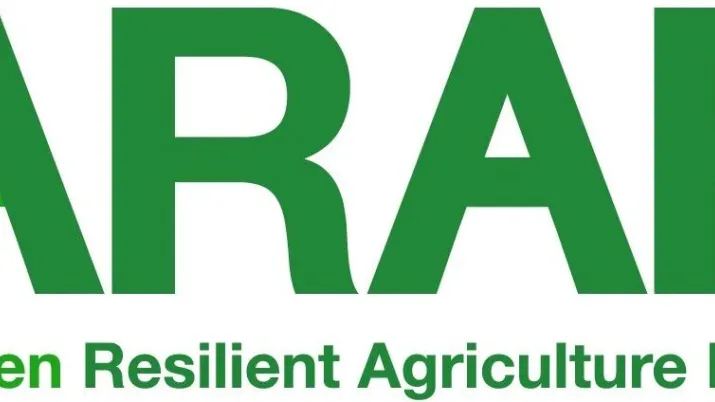Share the page
In Sub-Saharan Africa, the ARAF fund is strengthening the climate resilience of smallholder farmers
Published on


Private Sector & Development #38 - Climate change adaptation: how the private sector is scaling up
To mark COP27 held in November 2022, the 38th issue of Private Sector & Development magazine is dedicated to climate change adaptation and presents the drivers for action of Development Finance Institutions and the private sector faced with the challenges of the climate crisis.
Financed by several partners and development finance institutions – including Proparco, via AFD Group’s FISEA+ facility – the ARAF fund targets the issues of food security and climate change. It invests in start- ups offering innovative solutions to improve the conditions and climate resilience of smallholder farmers in East and West Africa. Tamer El-Raghy, its managing director, provide further details.
Tamer El-Raghy’s assessment is clear. “Climate change is wreaking havoc here,” warns from Nairobi the manager of the equity fund ARAF (Acumen Resilient Agriculture Fund) which operates in several African countries affected by climate change. Intense floods followed by long periods of drought which degrade cultivated areas… “These disruptions weigh especially on the most vulnerable – women, children – and small-scale farmers who have very few means to protect and boost their crops.” This high exposure to these climate events consequently makes the performance of the agriculture sector in Kenya – and everywhere else in Sub-Saharan Africa – highly unstable, points out this expert who graduated from universities in Cairo and New York. “Indeed, over half of the people living in poverty are smallholder farmers. Yet they provide 80% of the food consumed in the region.” This illustrates how climate change, which hundreds of thousands of African farmers are facing, weakens local economies and exacerbates food security.
30% of beneficiaries live below the poverty line
To address this situation, the ARAF fund, which was launched in 2020 by Acumen Capital-Partners – a subsidiary of Acumen, an organization specialized in supporting social enterprises in Africa –, invests in local start-ups offering innovative solutions to smallholder farmers. The objective is to build an ecosystem that will give farmers in East and West Africa the means to increase their incomes and improve their living conditions and resilience to climate change. This adaptation requires diversifying crops (corn, vegetables, etc.), improving irrigation and facilitating access to the most climate-resistant seeds and species. “We’re currently investing in 6 start-ups1 and are ultimately targeting 5 to 7 additional investments by 2026,” says Tamer El-Raghy. “We target the most vulnerable farmers. 30% live below the poverty line. Through its action, ARAF seeks to reduce poverty, strengthen climate resilience and demonstrate the impact of investment in resilient agriculture.” ARAF is supported by the Green Climate Fund (GCF) and is financed with $58 million from several partners and development finance institutions, including Proparco which took a $5 million stake in 2021, through FISEA+, the AFD Group’s facility implemented by Proparco under the Choose Africa initiative. Over the next 4 years, the fund aims to safeguard some 1,200 jobs and indirectly support a total of 2 million smallholder farmers.
The impact of the ARAF fund on farmer well-being

Several crops every year
On the ground, the ARAF teams regularly measure the impacts4 on the living standards of farmers and their work. “The activities of the start-ups we’re supporting have already had an impact on some 400,000 farmers in Sub-Saharan Africa. 43%5 of them report that they are now resilient to the consequences of climate change and 79% say that their incomes have increased,” says the fund’s CEO. The Kenyan start-up Sun- Culture, which supplies solar irrigation systems to its clients, estimates that on average there has been a 120% increase in the disposable income of the farmers who benefit from its innovations. This is the case of Josephine Waweru, a farmer specialized in coffee growing. She is based in Kirinyaga County, in central Kenya, and has installed a solar pump system supplied by SunCulture. “I used to use a really expensive and polluting gasoline system. I’ve also been able to diversify my crops to cope better with the risks related to climate change,” says the farmer. This observation is also shared by Jamleck Gichovi Karuri, who is based in another region in Kenya badly affected by the prolonged droughts. Thanks to a solar water pump system supplied by SunCulture, this breeder and farmer can now feed her livestock and harvest several crops every year.
Technological advances for the benefit of agriculture
“With climate change, rainfall in Sub-Saharan Africa has declined by over 100 mm a year since the mid-1970s,” says Samir Ibrahim, cofounder of SunCulture. As a result, Africa, which has 65% of the world’s uncultivated arable land, has an annual food imports bill of $35 billion. Yet with the technological advances in agriculture, the continent should be able to feed its population without the slightest problem. “For this to happen, these advances must focus as a priority on helping smallholder farmers who are the most vulnerable to climate change,” says Tamer El-Reghy. “It’s both a need and an emergency.”
How the Green Climate Fund is using ARAF funding to continue to tackle climate change
Interview with Lilian Macharia, Director, Portfolio Management Division, Green Climate Fund
- What is Green Climate Fund's (GCF) global strategy?
GCF’s Strategic Plan for 2020-2023 reiterates the target 50:50 balance between mitigation and adaptation, as well as a minimum allocation floor of 50 percent of adaptation resources to particularly vulnerable countries. As the window for climate action narrows, GCF aims to deploy adaptation support inclusively to continue to meet the urgent needs of the most vulnerable countries, people and communities. GCF targets areas conventional finance cannot reach and sets up building blocks for systemic adaptation investment. It also aims to deploy support catalytically by using its significant investment risk appetite to test and scale up approaches that accelerate the transition from an incremental adaptation response to a transformational and systemic one. GCF seeks to leverage its comparative advantages to accelerate adaptation investment planning and scale up adaptation finance to help close the adaptation gap in line with developing countries’ Nationally determined contributions (NDC), National adapation plans (NAPs) and long-term strategies.
- How does GFC support ARAF projects?
GCF provided an anchor investment in ARAF of up to USD 23M toward a target fund size of USD 50M by de-risking investment through a first-loss facility. Based on the success of ARAF, it is expected that GCF’s capital can provide higher leverage potential in follow-on funds and lower first-loss requirements once the commercial viability of investing in climate resilient agriculture is established. GCF provided USD 3M in grant funding towards a USD 6M technical assistance facility, to help investees build climate resilience. The grants will raise awareness, steer crop choices in line with climate forecast, and promote adaptation tools and techniques and income stream diversification. ARAF is expected to develop new climate adaptation impact measurement tools that help other investors integrate climate adaptation considerations into their investment criteria.
- How do you actually measure the impacts of ARAF projects?
ARAF has an impact at three levels, namely on lives impacted, on farmer well-being and on climate resilience. To measure the impacts, ARAF reports against core indicators that are in line with GCF’s results management framework. At the impact level, ARAF reports on the number of the Fund’s Direct and Indirect Beneficiaries (disaggregated by gender). At the outcome level, GCF measures the increase in the generation and use of climate information in decision-making, additional adaptive capacity and reduced exposure to climate risks, increase in awareness of climate threats and risk reduction processes, as well as any increased resilience and enhanced livelihoods of the most vulnerable people, communities and regions. GCF also measures increased resilience of health and well-being, and food and water security.
Further reading
Proparco invests in ARAF, the first-of-its-kind equity fund to drive climate adaptation for smallholder farmer...
Proparco - through FISEA+, the AFD Group fund advised by Proparco – signed a USD 5 million investment in Acumen Resilient Agriculture Fund (ARAF). The fund invests in agri-startups in East and West Af...
Published on july 27 2021

